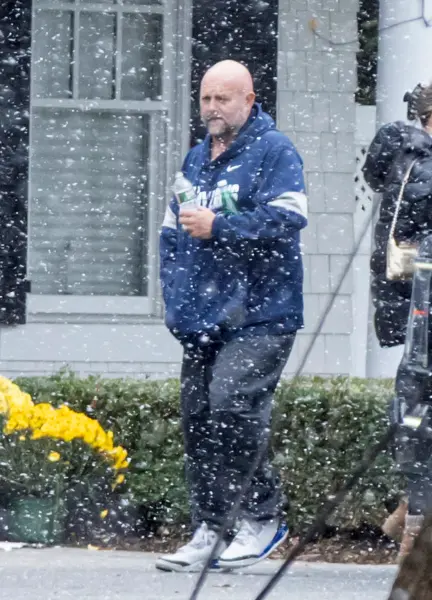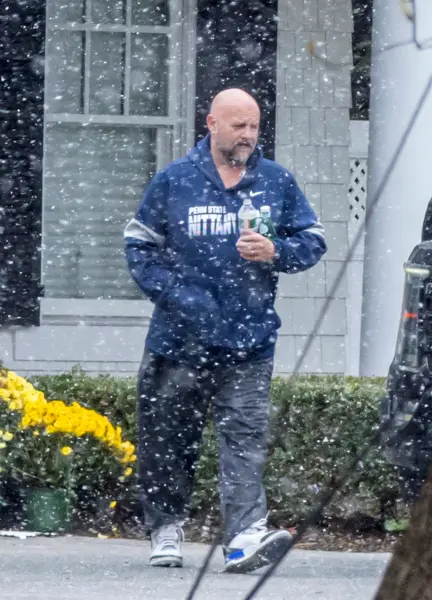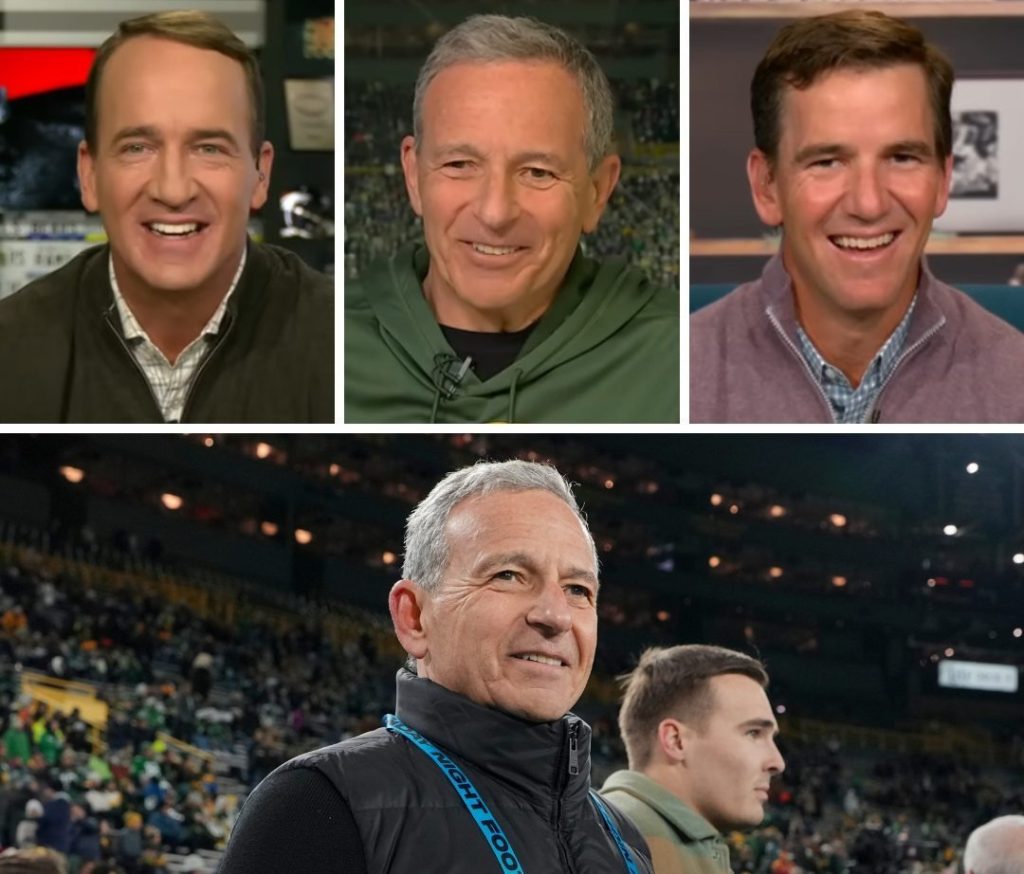Disney CEO Bob Iger Sparks Outrage After Dodging Questions About the YouTube TV–ESPN Dispute During Monday Night Football Appearance with the Manning Brothers
Disney CEO Bob Iger appeared on ESPN’s ManningCast Monday night in what many fans expected to be a clarifying moment in the ongoing YouTube TV–ESPN standoff. Instead, his brief, genial chat with Peyton and Eli Manning left millions of frustrated viewers even more irritated. The long-simmering dispute between Disney, which owns ESPN, and Google’s YouTube TV platform has stretched into its second week, with subscribers still unable to stream Monday Night Football through the service. Yet during Iger’s on-air appearance, not a single mention was made of the corporate stalemate keeping fans from watching one of America’s most beloved sports programs.

As social media exploded with reactions, the consensus was immediate: viewers wanted answers, but all they got was small talk about football strategy. For many fans, the silence on the issue wasn’t just disappointing — it was infuriating. Some took to X, formerly Twitter, to vent their frustration. “Love the ManningCast but this is pathetic!” one user wrote, summing up a flood of similar posts. Another added, “Bob Iger is on live TV while ESPN is blacked out on YouTube, and not one question? Come on.”
Iger’s appearance came during the Philadelphia Eagles’ Monday Night Football matchup against the Green Bay Packers, a game that drew millions of viewers — though notably fewer on streaming platforms due to the ongoing blackout. The Disney–YouTube TV dispute centers around carriage fees, a familiar sticking point in modern media as traditional television and streaming platforms battle for control of sports rights. ESPN, long a powerhouse for live sports content, is one of Disney’s most valuable properties. But its licensing terms, including the price it charges distributors like YouTube TV to carry its channels, have led to recurring tension with streaming providers.
This latest breakdown left YouTube TV subscribers without access to ESPN, ABC, and other Disney-owned channels. The blackout has been particularly frustrating for NFL fans, given ESPN’s central role in airing Monday Night Football. And yet, when Iger appeared in good spirits on ESPN2’s alternate broadcast with the Manning brothers, there was no hint of the brewing controversy.
The tone of the interview was relaxed and light-hearted. Dressed casually and smiling from the sidelines, Iger joined Peyton and Eli for a short segment early in the first half. The trio discussed topics like game-day atmospheres, player safety, and even the infamous “tush push” — the controversial quarterback sneak play popularized by the Eagles. Iger chuckled as he admitted to being “impartial” about the play, a comment that drew polite laughter from the Mannings but a very different kind of reaction online. Fans immediately noticed what wasn’t being discussed.

As one sports journalist noted, “The timing couldn’t have been more tone-deaf. Millions of paying subscribers were locked out of ESPN content, and the CEO is on live TV talking about a quarterback sneak.” The moment, which should have been an opportunity for Disney to reassure customers or address the dispute in even the vaguest terms, instead became a public relations misfire.
The silence was especially glaring because Iger, one of the most visible executives in corporate America, has spent much of 2024 and 2025 trying to restore Disney’s image amid multiple challenges — from labor disputes to streaming wars to a shifting entertainment landscape. Under his leadership, ESPN has been at the center of Disney’s strategy to balance traditional broadcasting with its growing digital presence. The network’s flagship streaming platform, ESPN+, has grown steadily, but partnerships with external providers like YouTube TV remain critical to reaching broader audiences.
The dispute reportedly stems from disagreements over pricing and bundling terms. Disney wants higher carriage fees for its suite of channels, arguing that its sports content — particularly live events like Monday Night Football and NBA broadcasts — drives massive viewership. Google’s YouTube TV, on the other hand, has pushed back against rising costs, claiming that such increases would unfairly raise subscription prices for users. Negotiations between the two companies have been ongoing for months, but when their contract expired two weeks ago, the blackout went into effect.
Since then, subscribers have been caught in the middle, paying full price for a service that’s suddenly missing some of its most popular channels. For many, the frustration has reached a boiling point. The absence of any mention of the dispute during Iger’s ManningCast appearance struck a nerve — particularly given how many viewers had hoped for acknowledgment, if not resolution.
“It’s not just that he didn’t talk about it,” said one media analyst. “It’s that he was there, on ESPN, in the middle of the issue, and chose to pretend nothing was happening. That sends a message — intentional or not — that the viewers’ frustration isn’t a priority.”
The irony wasn’t lost on fans that the interview took place during Monday Night Football, the very product they were fighting to watch. Some subscribers canceled their YouTube TV accounts in protest, while others flooded customer service lines demanding updates. Google, for its part, has stated that it remains “committed to reaching a fair deal” but accused Disney of “seeking unreasonable increases” in fees. Disney has countered by saying it values its partnership with YouTube TV but must “ensure fair market value for our content.”
In an era where live sports remain one of the last bastions of traditional television revenue, these disputes have become more frequent — and more visible. Carriage blackouts between media conglomerates and streaming platforms are now a common occurrence, often timed near major sports events to maximize leverage. For Disney, ESPN’s value has always been its ability to deliver live moments audiences can’t miss. For YouTube TV, maintaining access to those moments is essential to keeping subscribers from jumping to rival services like Hulu + Live TV or Fubo.
But what happened Monday night underscored a broader problem in the streaming age: corporate silence can speak louder than words. As the broadcast went on, social media filled with memes and angry posts. Clips from the ManningCast circulated with captions like “Bob Iger dodging the ESPN blackout question like…” followed by GIFs of athletes running or ducking. It became clear that fans were not amused.
Even sportswriters who typically avoid taking sides in corporate disputes chimed in. “Iger’s non-comment was the comment,” one columnist wrote. “By pretending it wasn’t happening, Disney turned a business issue into a fan issue.”
Behind the scenes, insiders say Disney is aware of the growing backlash but is wary of negotiating through the media. According to industry sources, talks with YouTube TV have resumed in recent days, though neither company has offered a timeline for resolution. “Both sides know they need each other,” one former ESPN executive said. “But both also know whoever blinks first sets the tone for future deals. That’s why no one’s rushing to make concessions.”
Still, the optics of the ManningCast interview could hardly have come at a worse time. With the NFL season in full swing and college football playoffs approaching, ESPN’s absence from one of the largest streaming platforms threatens to alienate a key demographic — younger viewers who primarily consume sports digitally.
For Bob Iger, whose tenure as Disney’s returning CEO has been defined by tough calls and corporate recalibrations, this incident adds another layer of public frustration. His reappointment in late 2022 was meant to stabilize the company after years of internal upheaval, and to many investors, he’s succeeded in that regard. But his critics argue that Disney’s increasingly combative relationships with distributors and its high content costs reflect a company still struggling to adapt to modern viewing habits.
As for the Mannings, neither Peyton nor Eli has commented on the backlash. Known for their good-natured, conversational approach, the brothers are unlikely to have been the ones to avoid the topic — network executives typically determine interview guidelines in advance. Still, their silence on-air became part of the moment, with viewers wondering whether ESPN management had quietly instructed them to steer clear of the dispute.
In the end, Bob Iger’s lighthearted appearance may have inadvertently amplified the very tension Disney hoped to downplay. Fans got no answers, no clarity, and no acknowledgment — just a brief cameo from the man at the center of it all.
By the following morning, clips of the exchange were trending, not for what was said, but for what wasn’t. It was a modern paradox — a media mogul, on his own network, in front of millions, surrounded by a controversy that everyone could see, but no one dared mention.
The YouTube TV blackout remains unresolved. Subscribers continue to wait, vent, and wonder if their patience will last longer than the stalemate. And as for Iger, the episode serves as a reminder that in the era of streaming, silence is rarely the safe play — especially when the world is watching.


